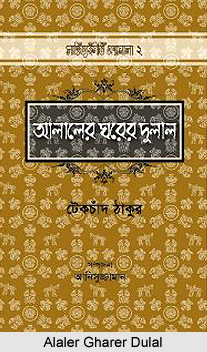 Alaler Gharer Dulal is a work of 19th century Bengali literature written by Pyarichand Mitra. It is one of the works in a series of literary works dealing with the prevalent Babu culture in 19th century Bengal. This work was first published in installments from 1855 to 1857, so there is a time gap of thirty years with regard to treatments of Babus in prose. Alaler Gharer Dulal, `The Pampered Son of a Front-Rank Family` is different from the preceding texts in various respects. It is a full-length narrative of around 130 pages. The level of prose construction is quite well-developed and punctuation is firmly established. The syntax too is quite solid. Further, there is remarkable stylistic differentiation: chain-of-events narration alternates with scenic descriptions, dialogues, general comments, etc. The effort to head towards the presentation of a broader social canvas is noticeable, and as a result it is seen that the Babu this time is embedded in his surrounding society and is the cause and also victim of social conflict.
Alaler Gharer Dulal is a work of 19th century Bengali literature written by Pyarichand Mitra. It is one of the works in a series of literary works dealing with the prevalent Babu culture in 19th century Bengal. This work was first published in installments from 1855 to 1857, so there is a time gap of thirty years with regard to treatments of Babus in prose. Alaler Gharer Dulal, `The Pampered Son of a Front-Rank Family` is different from the preceding texts in various respects. It is a full-length narrative of around 130 pages. The level of prose construction is quite well-developed and punctuation is firmly established. The syntax too is quite solid. Further, there is remarkable stylistic differentiation: chain-of-events narration alternates with scenic descriptions, dialogues, general comments, etc. The effort to head towards the presentation of a broader social canvas is noticeable, and as a result it is seen that the Babu this time is embedded in his surrounding society and is the cause and also victim of social conflict.
Matilal, the protagonist, resists the various efforts at educating him and the work of a number of teachers goes to waste. Bad company in a boarding school in Kolkata does the rest. Unlike English children who listen to their parents` advice and engage in `innocent play`, `Boys of this country do as they see their desire is always to wear clothes of golden thread, jewels, pearls and corals, and to go to the garden with flatterers and Veshyas and practise Babugiri with eclat.` Thus the Babu engages in mixing and singing with all kinds of odd people, watching dancers, sometimes a little unjustified quarreling and beating, consuming all sorts of available drugs; together with a most peculiar outlook from the crown of gold threads on their heads to the English shoes with silver buckles on their feet. Pyarichand`s Babu is not just the spoilt, wasteful, conceited, intoxicated, quarrelsome and outlaw-ish lover of music and Veshyas, he now acquires a new quality of evil. Matilal, in the course of events, tries to rape a young girl together with his friends; does not care about the approaching death of his father; slaps his mother and drives her out of the house; and cheats his younger brother out of his share of the heritage. Alaler Gharer Dulal is also the story of those who suffer from the Babu`s misbehavior and in confrontation with a new counterpart: the ideal characters of Baradababu and his disciple, Matilal`s younger brother Ramlal, and the educative ideal they incorporate.
In Alaler Gharer Dulal, however, all wicked characters get their chance to repent. For some it comes too late to change anything, bur for Matilal it comes in time. Out of money and left by his friends, Matilal wanders to Varanasi where he finds a spiritual guide who gives his life a new turn. In the meantime, his troubled mother and sister find Ramlal, his brother, in Mathura, and on the way back via Varanasi they meet Matilal who has become a diligent student of the Upanishads. They go back to their native place Baidyabati in Bengal, and their house is restored to them. Tirthas (holy places), Upanishads, and Utilitarian ethics thus come to Matilal`s rescue. His Babuness is conceived as a disease to be cured, and moreover, a disease specific to decadent nineteenth-century Bengal. It is absent in English society, where proper education keeps children on the right track; new rules of education are necessary to save Bengali society from Babugiri or Babuyana.Rather than the Charita, the preferred literary form in most of the other works of the time, it is the novel that inspired Pyarichand. Babu Matilal is invested with more individual characteristics than the preceding Babus. Here, among other things, the balanced cultivation of bodily and mental faculties and their focusing in Bhakti towards the godhead is expounded. In Pyarichand`s work, boldly put, the Babu goes Bourgeois.



















